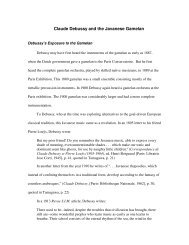Music Preference 1 - Brent Hugh's personal and business web pages
Music Preference 1 - Brent Hugh's personal and business web pages
Music Preference 1 - Brent Hugh's personal and business web pages
Create successful ePaper yourself
Turn your PDF publications into a flip-book with our unique Google optimized e-Paper software.
The <strong>Music</strong>ian<br />
Introduction<br />
Why Influence <strong>Music</strong> <strong>Preference</strong>?<br />
<strong>Music</strong> <strong>Preference</strong> 3<br />
<strong>Music</strong>ians have a natural interest in underst<strong>and</strong>ing <strong>and</strong> influencing the public's preference<br />
for the type of music they play. Classical musicians, for instance, worry about the decline of<br />
audiences for their music. The topic is often addressed at professional meetings <strong>and</strong> conferences<br />
<strong>and</strong> the decline of the classical music audience has been much ballyhooed in the popular <strong>and</strong><br />
periodical literature, too (Pridinoff, et al., 2000; Lebrecht, 1997; Small 1998). Despite all the<br />
attention given to the purported problem, it turns out that empirical evidence for or against the<br />
decline of the classical audience is difficult to interpret (Repp, 1999; Newberry, 1999); the<br />
classical audience appears to be declining in some sectors <strong>and</strong> increasing in others.<br />
Regardless of the general rise or decline in audiences, the classical performer has an interest<br />
in creating a preference for classical music in new audiences <strong>and</strong> increasing the preference for<br />
classical music among those who already enjoy it. <strong>Music</strong>ians who wish to perform must create<br />
an interest in <strong>and</strong> a liking for the type of music they play among some audience somewhere or<br />
they will not be performing music for long.<br />
The <strong>Music</strong> Educator<br />
<strong>Music</strong> educators may have a different reason than performers for influencing the musical<br />
preference of students. In American society, the highbrow musical taste in previous decades was<br />
elitist, exclusivist, <strong>and</strong> focused on classical music as performed by the best musicians--in a word,<br />
it was snobbish. In the last two decades or so, the highbrow musical taste has shifted. It is no<br />
longer snobbish, but more eclectic <strong>and</strong> musically omnivorous (Peterson & Kern, 1996). The new<br />
musical omnivore puts importance on music from a tremendous variety of sources--folk music,





